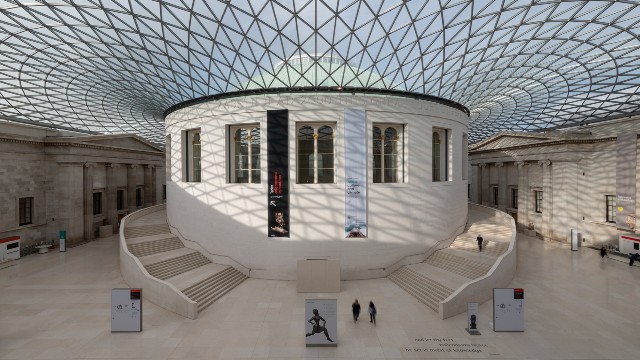The British Museum - A short meditation
It is the 3rd of August 2022 and, as usual, when no worldwide pandemic is terrorizing the globe, I am visiting my family for two weeks in the rampant and civilized land of Britain. Today the plan is to go up to London on my own and visit the capital, and I have decided to set the main objective of spending the day at the British Museum. It is not my first time there, I did visit the building when I was a very young boy, but I remember very few things about it as we did not spend very long inside it.
When I was a little kid I always maintained I wanted to be an archaeologist, and I was fascinated by history. I remember being very excited about seeing the Rosetta Stone and getting completely mind blown by the Egyptian mummies. Years later, the feeling still remains the same, this time though, the visit felt more special, as I was the dependant of only myself and could spend as much time as I wanted inside the museum.
But, what goes up must go down, and like the yin and yang I was conflicted with my excitement and enjoyment of what I was about to visit. I hail from a British dad and a Spanish mother, so out of all people I could not have more of a colonialist past, and when I was visiting the artefacts in the museum, the idea of colonialism and how everything got to be there would not get out of my head.
I have always maintained that bigger and better reparations should be given to ex-colonies by the countries who colonized them, especially on the cultural side. And one of the main things to do would be return and restore all the cultural heritage that was taken during those years. This became the central point of the internal debate I had when walking around the rooms of the immense building. I knew for a fact that none of those artefacts should be there at all, and that even if no harm was done during the procedure of acquiring them, the Europeans who took them had the privilege to such actions due to the years and years of exploiting other parts of the world which were wrongfully under their control. (Although I do not agree, my grandmother argues that with certain artefacts, like the case of the Elgin Marbles, it was the colonialists who protected the artefacts from further destruction by the Ottomans; and it was the French who recovered the Rosetta Stone, which was going to be used as a construction piece for a temple.)
 |
The Parthenon statues or Elgin Marbles in the British Museum (Source: The New York Times)
|
 |
| The Rosetta Stone in the British Museum (Source: The British Museum Blog) |
|
Because despite it's past and context, which we should never forget, the British Museum is a beautiful gallery full of humanity's greatest creations from all around the planet. A complete visit around the museum is one of the most eye-opening experience's one can ever have, and when doing so, as you pass the grand collection of the wide variety of cultures, civilizations, leaders, religions, cities and artists you realize how similar human beings can be no matter how much time and space stands between them.
What fascinates me the most and is this internal capacity of humans for creating and inventing things like religions, stories, music, dances, statues, paintings, pottery, drawings, etc, no matter where in the world they're from. Every culture has had its own gods, even cultures that had oceans between each other had similar stories for their deities, carved similar statues and had similar praying rituals. It's like comparing Jesus to Allah; the gods of the Aztecs to the ones of the ancient Egyptians; or the dances and dresses of certain indigenous tribes in Africa to other indigenous ones in North America.
 |
Aztec artefact (Source: British Museum website) |
 |
Ancient Egyptian mummies (Source: flickr) |
It is most certainly fascinating, and I think that one of the world's biggest failures is having upon itself the fact that not everybody can pay a visit to the museum. I feel like it should be mandatory to anyone travelling to London to go there, to understand where humans come from, our differences and similarities, our conflicts and agreements, our history, to which we owe so much yet, more and more, we give back so little.
 |
Assyrian Lion Hunt, my favourite artifact. (Source: British Museum website) |














I'm conflicted on this. I agree that if a country wants some of its cultural heritage back then back it should go. But, as your Nana said many of these things would not be here were it not for there being collected and protected in this way. If you look at the destruction of culture by some modern countries in conflict, Syria being one. Iraq another. Afganistan. Then being able to see these things in a relatively safe enviroment, and for free, is quitr something. It's a difficult one. For example should art like paintings be returned to their country of origin? All Van Gogh in Holland? Goya only in Spain?
ReplyDelete